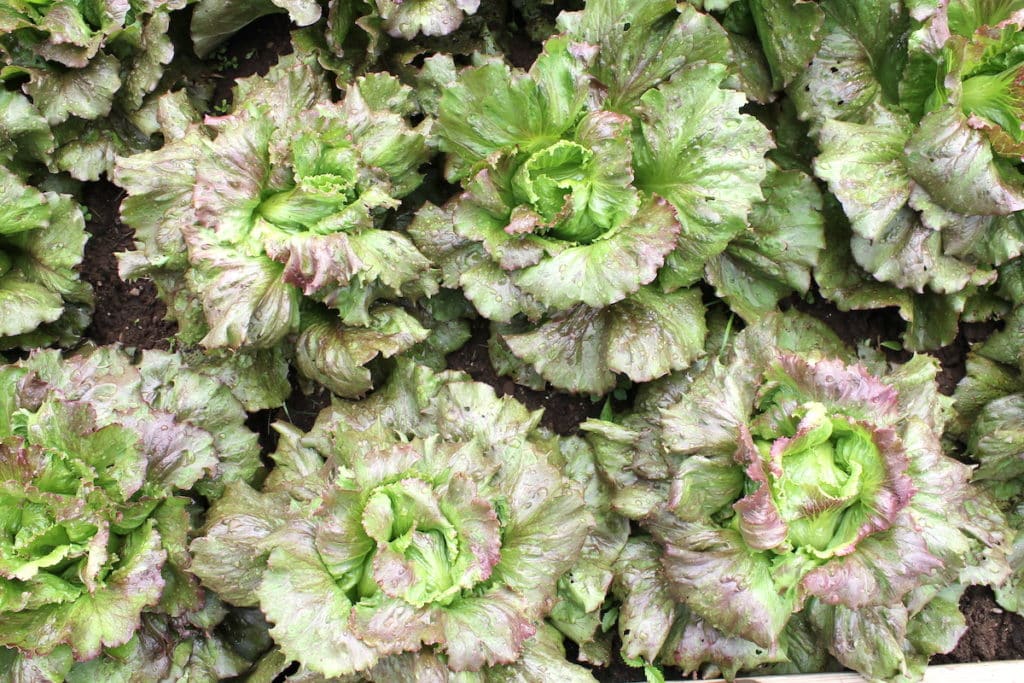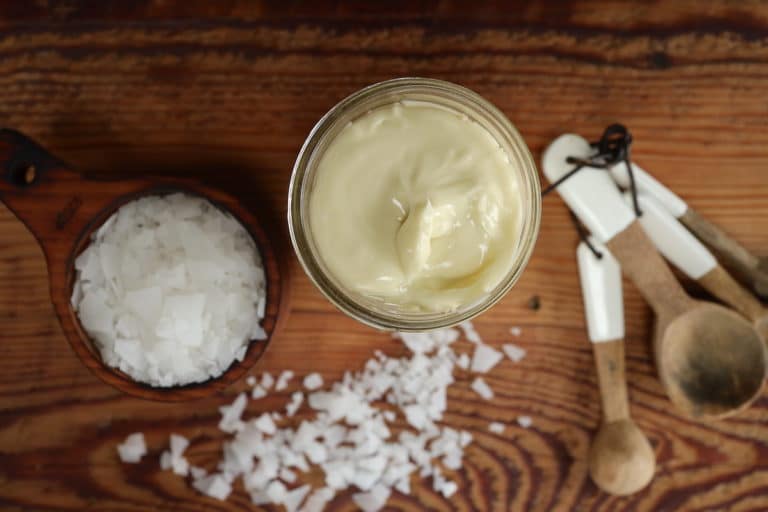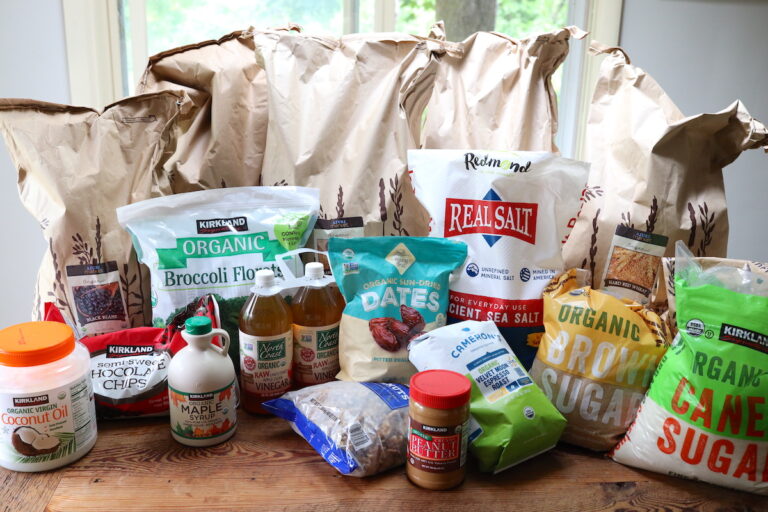7 Tips to Save Money on Organic Groceries
Given our modern systems, cheap organic food sounds like an oxymoron. With prices skyrocketing, this notion seems near impossible. But I beg to differ. We have been purchasing high quality, locally grown, organic food for a number of years while sticking to a very meager budget. I will share all of our tips and tricks on how you can save money on healthy, organic groceries.
Our Background on Saving Money for Groceries
When we were newly married, we were both working as missionaries for our church and made a bare bones salary. This small income, forced us to learn the art of making a budget and sticking to it. We became passionate about this idea of spending less while still feeling like we were living richly. In fact, we’ve lived off of around $30,000 for the last several years and write about how in our post – Setting Up A Homestead Budget For One Small Income.
In the first few years of our marriage, I learned the art of couponing and became an expert. I could fill a whole grocery cart for pennies. It was exhilarating. But, most of the food I was purchasing (or really being handed for next to nothing) was processed and packaged junk food.
When we began to experience health challenges, we decided to remove processed food from our diet and my couponing days were done. However, I learned a lot of principles in that season on how to stretch our dollars, and especially our food dollars, that were applicable when we began our journey into eating high quality, locally grown, organic food.

7 Strategies to Save Money on Organic Groceries
1. Clean out your pantry and fridge before shopping
Wasted food means wasted dollars. My philosophy is to clean out our fridge/freezer/pantry as much as possible before stocking up again. It really is amazing how many delicious, creative meals you can come up with when you are forced to use the few items left in your fridge or pantry. Some of our favorite meals have been created that way. The best part is, no food is wasted.
I’ve found that as soon as you stock up on new groceries, all of the sudden anything that had been there is pushed to the back, forgotten, and left to mold or expire in the back of your fridge. By eating everything you already have first you are saving money, not wasting food. And you get to partake in your own Chopped challenge! Win, win, win!

Clearing out your fridge and pantry also allows you to minimize trips to the store. Sales ads want to bring you to the store for a reason. They know many purchases happen by impulse and all they need are customers in the aisles. Reducing those opportunities is a great way to save on organic groceries. Chances are, you will purchase around the same number of essential items whether you go to the store more or less often. So, going less will limit the non-essential purchases.
2. Shop for what’s the best price instead of an exact item
This is what I like to refer to as a flexible meal plan or grocery list. When I go to the store, I never have an exact list. Instead I will simply write “fruits and vegetables.” Then, I shop based on what items look the best and are the best price. From there, I make my meal plan after I’ve purchased the items at the best prices.
If you are trying to make a certain recipe, you can still implement this strategy. Maybe a recipe calls for sweet potatoes but sweet potatoes are super expensive. But you notice organic carrots or butternut squash are on sale. Instead of purchasing sweet potatoes for the recipe, I’d swap it for carrots to create a similar recipe while saving money.
3. Eat nose to tail
While eating “nose to tail” is becoming more and more trendy, it’s also the most economical, healthful, and delicious way to eat. By only consuming the same 5-6 cuts of meat (i.e. chicken breasts, ground beef, steaks, ham and bacon) you are missing out on so many valuable nutrients that were the prized cuts of meat for our ancestors.
One of my favorite ways to do this is to purchase a whole chicken instead of the individual parts. Every week, I slow cook a whole chicken with water and am left with shredded chicken for quick and easy meals and a few quarts of delicious, gelatinous broth.
Organ meats are another great way to stock up on meat that is inexpensive and the most nutritious. If you are not a fan of cooking up the organ meats as-is, there are easy ways to sneak them in without anyone knowing. In our posts, beef heart burgers and How Eating Liver Changed My Life, we go into detail about how we do this.

4. Shop seasonally
Whether or not you are growing the food yourself, I like to think about how people would have eaten prior to the convenience of grocery stores. For example, in the summer when berries are abundant, they would stock up on berries, preserving them any way that they could.
Adopt a similar mentality. When berries are abundant, they will be less expensive, taste better, and be at their peak nutrition. This is when we like to stock up by purchasing several flats of strawberries or blueberries locally and freeze them to have all year round.

When butternut squash and potatoes are in their prime, stock up. The beauty of these is that they are wonderful storage crops. I just cooked up a winter squash in June that we harvested in October of last year.
Stocking up when things are in season can, 1) greatly reduce your overall grocery bill all year, 2) give you the most nutrient dense food, and 3) support local farms.
5. Avoid prepackaged convenience food
While the allure of ready to go bars, snack packs, and pre-sliced veggies is real, purchasing these items will greatly increase your grocery bill. Prepackaged convenience items are often significantly over priced compared to their single ingredient or unprocessed counterparts.
Instead of purchasing individual cheese slices or single serving yogurt cups, opt for a block of cheese or a quart size container of yogurt. You will not only save money, but there is also less waste. Items are processed even more to get them into this convenient, single-use state. This results in a greater likelihood of extra ingredients and processes that you really don’t want to be consuming. Buying items as close to their natural state as possible will save you money and often be more nutritious.

6. Keep it simple
I get it. While all this advice WILL save you money, it will require more time for cooking and preparation on your end. But it is possible to cook real, from scratch meals without it taking a ton of time.
With every meal, I prioritize having a solid protein and a solid carbohydrate. While this could be a more time-consuming soup or casserole, sometimes it just looks like scrambled eggs and an apple or leftover chicken and some rice. Simple meals make eating real food on a budget way more doable for busy families.
7. Prioritize where your dollars go
When you learn about the realities of the food system—chemicals sprayed, franken ingredients abounding, factory farmed meats—it’s tempting to want to get the crème de la crème of everything. But sometimes, your budget won’t allow for that and you have to do the best you can.

While I’d love to buy only organic fruits and veggies, we prioritize buying items listed on the dirty dozen organically. Sometimes, doing the best with what you have and giving yourself grace is the most healthful thing you can do.
How We Save Money Shopping for Organic Groceries
We now grow the majority of the food we consume (This post on how we feed our family year round from our homestead shares more). But, it hasn’t always been this way and we used to rely a lot more heavily on farms and grocery stores.
Even now there are some things we purchase from the grocery store. My favorite grocery stores are the non-chain ethnic grocery stores. I generally find that they have a great produce selection, usually with organic options. The costs are often significantly less than the higher end, more natural grocery stores.
We do have a Costco membership that we were gifted and there are a few items that I like to purchase from there – primarily baking and dry goods.
What about you? How do you save money on organic groceries? We would love to hear in the comments below. While making this choice to shop and eat this way certainly isn’t the easiest option, we believe it is completely worth it.
Get more budgeting inspiration:
- Setting Up A Homestead Budget For One Small Income
- 14 Frugal Homestead Ideas
- Buying a Homestead on a Budget
Pin it for later!







